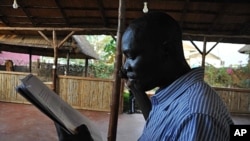Wracked by decades of civil war and now trying to build a new nation from scratch, South Sudan has been unable to put the arts at the top of its priority list. However, the impoverished nine-month-old country is sponsoring one of 37 international troupes chosen to perform a Shakespeare play next month at London's famed Globe Theatre - all in their local tongues. The Globe is where many of the Bard's [Shakespeare's] works were first performed more than 400 years ago. Although South Sudan is still gripped by violence and conflict, especially with Sudan, its former ruler, to the north, those involved in Juba’s culture feel the arts have a key role to play in achieving unity and peace for the young country.
With arms extended up toward the ceiling and ankle bells jangling as bare feet slap the floor, the cast of South Sudan’s Shakespeare group has put its original stamp on Cymbeline, a play adapted countless times by arguably the world’s most renowned dramatist, which they perform in their local dialect.
It is in Juba Arabic that the South Sudan Theatre Company will convey this semiromance, semitragedy next month in London’s Globe Theatre. The cast is one of 37 international companies selected to perform in a “Globe to Globe” festival of Shakespeare's works - all in the actors' local tongues.
'Special romance for South Sudan'
Cymbeline is a tale of love, hatred and power between warring states in Britain and Rome, but the organizers of this adaptation say it has special resonance for South Sudan, which gained its independence from Sudan only in July, after decades of civil war.
Undertaking the translation from antique English to a local dialect more spoken than written is no mean feat, but co-director Joseph Abuk says the “South Sudanization” of Shakespeare has been relatively easy.
"There are some symbolic things here and there that will be African enough to be South Sudanese, whether in costume, or whether in gestures, or whether in announcing certain events such as death or in announcing war," said Abuk. "Normally they bang the drums - you know, like the bouncing of a drum, pom, pom, pom, pom, which will be South Sudanese."
Playing Cymbeline's queen is Esther Bagirasas, who thinks Shakespeare will cause a huge stir in South Sudan, and will even be accessible to children, when the cast performs the work here at home. She is extremely excited to be performing in London and in her native tongue, having struggled through Shakespearean English for years.
"I studied drama at Juba University, so we were taught William Shakespeare’s plays, and one of them is Cymbeline. I read it before but it was so complicated to me to understand it, because the way it is written in English is very complicated," said Bagirasas. "It seems [written in] the old, old English, and the words are difficult. I don’t even know how that book succeeded to be translated ... to become Juba Arabic.”
Cymbeline’s other co-director, Derik Uya Alfred, hopes the Globe will be packed with many of the estimated 3,000 South Sudanese who live in London, and that others will come from Europe to see a play performed in their local language, from a country that many might not yet have seen.
Putting on map of arts
Alfred also hopes that South Sudan, as a country many thought would never see the light of day, can start putting itself on the map in the arts world when British theatre-goers get a taste of South Sudanese culture.
"It means a lot. It’s a very exciting moment for us as actors and as South Sudanese to be the first, I think [for the] group going out to represent our country, it’s going to be a moment of discovering ourselves, displaying our cultures and potential, because this play has given us a chance to go deep into our cultures and see relevant things - whether it is costumes or props - and try to bring that story out," said Alfred.
South Sudan’s independence day brought daylong street parties and nationwide euphoria in July, but the country is still beset by conflict - both with former foe Sudan to the north and internally, among some of the 60-odd tribes whose identity is still stronger than the new nation’s.
'Role in healing wounds'
Alfred and his cast believe that in addition to nation-building in a country that lacks roads and basic services, the arts can play a huge role in healing the wounds left by South Sudan’s bloody history.
"Art is very important, as it can address some of the issues and the challenges and bring it live to the people so that they can think about it," he said. "They can change their attitude, their behavior and they can think twice about things. We have been ambassadors for art. We have been advocating that arts is a way out. Art is what will bring us together, what will create the unity among us and in the sense that people start [to] learn about themselves and to be proud as people of one nation."
The actors hope they can inspire a future generation of Shakespeare players and fans. For now, their unbridled enthusiasm could only make the playwright proud.








